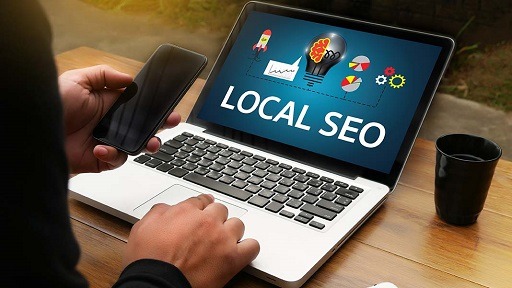On-Page Optimization Tips for Local SEO: When people think about local SEO, the major tactics that come into mind include Google Business Profile, local citations, and backlinks.
While these undoubtedly help capture the “near me” results, on-page optimization plays a very important role in signaling the search engines and helping provide an impact on your local rankings. Here’s how optimizing your on-page SEO will pay dividends in organic search results and MapPack results.
Here’s how to optimize your on-page content to boost your local search visibility.

Make sure NAP is consistently the same
The term NAP means Name, Address, and Phone Number. NAP is one of the most critical elements when it comes to your local SEO campaign. You need to ensure these three items are featured prominently on your website, which will be the do or die in whether people are going to find you in a local search. One perfect spot to place your NAP is on the footer, for that will give exposure on every page.
Linking your NAP to your Google Map further enhances its visibility. It is also good that your NAP be placed in the body of service area pages and contact pages. Consistency is very key with regard to NAP. Accuracy, for instances where Google may refer to it for verification, is only maintained by ensuring the same business information exists anywhere your potential customers find you online.
Listing your NAP on your website will allow the crawlers and bots to attach your Google Business Profile to your website and other local citations throughout the web. With regards to the NAP information, it’s best to look at the big picture and avoid minor details such as using an abbreviation versus spelling out street names. So long as you are consistent with one format, that really doesn’t impact your visibility in local search.
Spruce Up Your On-page Content
Your website content is a great place to begin establishing authority for your customers and the search engines alike in the areas you serve. Include specific details like landmarks and street names, but also state the services you provide in the area. Make sure that you communicate explicitly why customers in that location need your services.
Think of a seamless customer user experience with the same language and terminology as that of your locale. Consider how your prospective customers would look for your services in their local area. Would they include their city, neighborhood, or metro area?
Answering these questions gives you both the right content and keywords to use on your website. These keywords will be able to target both combination searches (“SPA in London”) and GPS-based searches (“SPA” when in London). This becomes particularly important for “near me” searches, wherein Google matches an individual’s location via IP or geolocation against service providers nearby to show relevant search results.
Targeting these keywords can be optimized by the creation of pages for which specific services are provided with specific service areas. For example, a SPA providing a pedicure service in London, Machester. The SPA should add, to the general SPA service page, other specific pages for their pedicures in London, Middlesex, Uxbridge, and East London. All these pages should have tailored and optimized emphasis on the location.
Keep in mind that some of these could be landing pages for users in search of location-based services. So, add some enthralling and informative content that will push the user through to the next page or to take action through your website. Make sure to conduct thorough research on the area you target.
People who are customers in that area know the local jargon and customs, and they will know whether or not you are somebody who knows the local scene. For that reason, being authentic to who you are, and showing you really care about the community will establish trust and credibility with potential customers.
Do Proper Header Tags Optimization
Using header tags is important for SEO, and if you haven’t already, it’s important to learn the best practices for using them. When you create service pages targeted to specific locations, you have more opportunities to use header tags with local-based keywords and services. Having well-structured header tags helps both site visitors and crawlers understand the page’s content and structure. Ensure that the header tags you use are relevant to the content on the page and do not overdo it with keyword stuffing, which could make it seem unnatural to both your visitors and the search engine crawlers.
Do Proper Internal Linking
Utilize internal linking strategically throughout your website to demonstrate to both your audience and the search engines that you are capable of serving customers in the targeted local area. When adding city names to your on-page content, utilize them as an anchor link to your service area pages.
In addition, you can incorporate widgets, lists, and blocks on top-level pages that include multiple links to your service areas to provide an SEO boost. One way to implement this is by creating a block on your website that highlights the metro areas you serve. This block could include the name of the metro, an image of the area, and a brief description. Each piece of text could then be hyperlinked to the corresponding location page on your site.
Local Business Schema
The local business schema type is a code that includes essential information such as addresses, reviews, hours of operation, social media accounts, service area geo-shapes, and departments that may not necessarily be mentioned in your on-page content.
By using schema, you can provide search engines with a comprehensive understanding of your business, including who you are, what you do, where you do it, and why others trust you, without overloading a single page with too much information. This approach also enables you to have more control over the information you display, rather than relying on search engines to gather details from various sources across the internet.
What are some ways to determine if these optimizations are effective?
After optimizing and preparing everything, it’s essential to measure the impact of your local SEO strategy. Several tools can help you do this, and we’ll briefly examine a few of them.
Geo-Grid Local Ranking Tools
Tools such as Local Falcon and Local Viking use geo-grid technology to monitor map results within a selected area. These tools provide a visual representation of your local rankings and allow you to schedule periodic scans to capture a snapshot of your results. This helps to track the performance of your site on maps over time and keep a history of your local SEO progress.
These scans are useful not only for monitoring your local map rankings, but also for tracking the effectiveness of your content and title tag optimizations based on specific keywords.
Local Search Results Tools
Local search result tools like Local Falcon, Merkle, and BrightLocal allow you to simulate the SERPs of your targeted local area, giving you a more accurate view of your local SEO impact. These tools also offer options to view Google Maps, select device options, and even get as specific as the zip code level.
Google Business Profile Analytics
Getting information directly from the source is always the best approach. When you make optimizations, you should see a boost in your Google Business Profile metrics such as click-throughs to your website, phone calls, or requests for driving directions if successful. As your visibility improves, you should naturally see an uptick in traffic.
When it comes to optimizing for on-page local SEO, it’s important to keep things simple and relevant to your business. If you can provide customers with what they’re looking for in the location they desire, the rest will come naturally. Your job is to ensure that you’re giving them the right information. Despite the rapid changes in local SEO, a solid on-page strategy will always be a winner for both you and your customers. If you want to grow your business by getting more leads and generating sales, you must hire an Enterprise SEO specialist for quick results.
![]()











